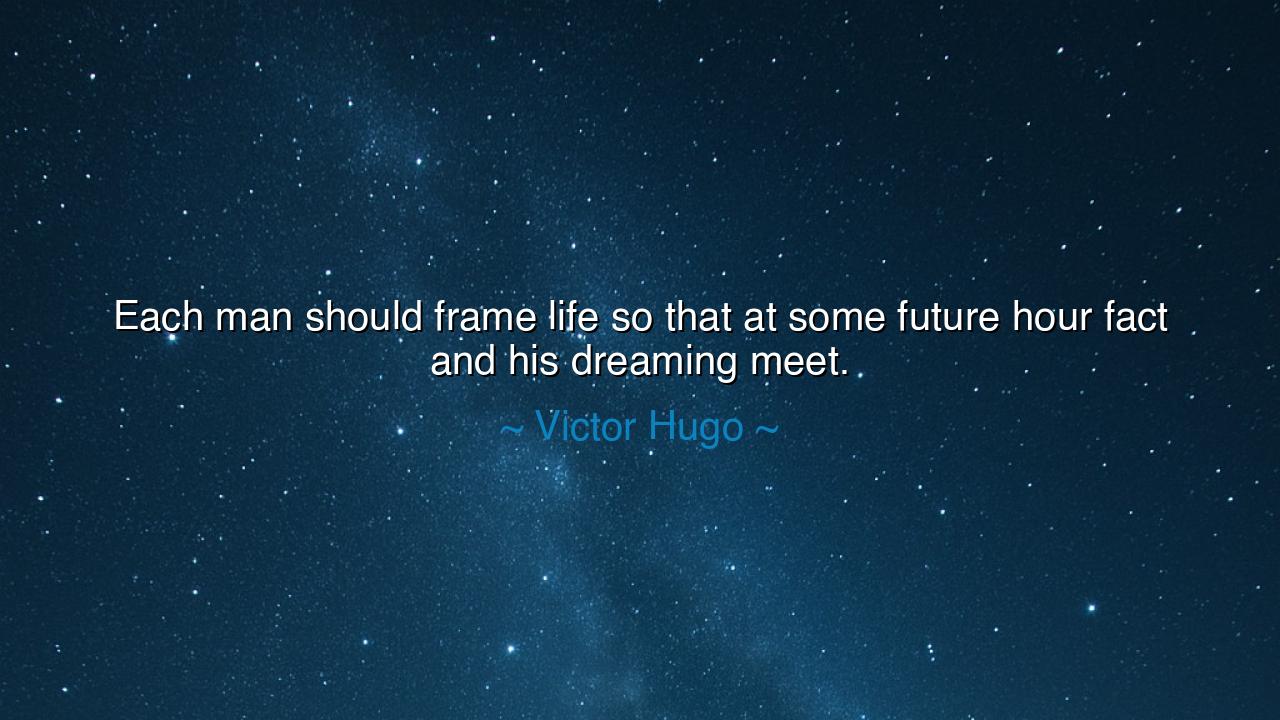
Each man should frame life so that at some future hour fact and






The great poet and visionary Victor Hugo, whose words have echoed across centuries, once proclaimed: “Each man should frame life so that at some future hour fact and his dreaming meet.” In this single sentence, Hugo unveils a truth that binds the human spirit across time — that our purpose is to shape reality until it mirrors the vision that burns within us. To live fully, he says, is not merely to dream nor merely to act, but to labor until dream and fact stand side by side, indistinguishable in the light of our perseverance. It is a call to harmonize the seen and unseen, the possible and the imagined — to turn longing into legacy.
To frame life, as Hugo instructs, is to live with intention, as the artist frames his canvas or the builder sets his cornerstone. It is not enough to wander through existence waiting for miracles to arrive. Dreams, though divine in their origin, must be given form through effort, discipline, and faith. Just as the sculptor carves beauty from stone, so must each soul carve destiny from circumstance. The ancients called this the union of vision and will — that sacred balance by which the unseen world of imagination breathes itself into the world of matter. When a man’s dreams guide his hands and his deeds honor his vision, he becomes not merely a dreamer, but a creator of reality.
The origin of Hugo’s wisdom is deeply rooted in his own life. He was not a philosopher locked away in abstraction, but a man of passion and struggle — exiled from his homeland, yet ever unbroken in spirit. His dreams of liberty, justice, and compassion did not remain on parchment; they became living forces through his words, shaping the minds of nations. When he wrote Les Misérables, it was not merely a story — it was his dream of redemption, equality, and the triumph of love over despair. In his lifetime, Hugo saw some of those ideals become fact — and others remain as stars still guiding humanity’s journey. Thus, he spoke as one who knew: that to dream is divine, but to manifest is godlike.
This union of dream and fact is seen in every age. Consider Leonardo da Vinci, the eternal seeker, who filled his notebooks with impossible visions — machines that could fly, bodies studied in divine proportion, cities designed for peace and beauty. Many of his creations were but dreams in his own time, yet centuries later, his visions became the foundation for inventions and discoveries that transformed the world. In Leonardo’s story, Hugo’s words find living proof: what one man dreams in faith, another brings into fact, and thus the future becomes the child of imagination.
But there is another side to Hugo’s teaching — a warning wrapped in hope. He reminds us that dreams without action are illusions, and facts without dreams are lifeless. The one who only dreams drifts through shadows, forever haunted by what could have been; the one who only works without vision becomes a machine, building without meaning. Balance, then, is the sacred path: to hold the dream gently in the mind while shaping the world boldly with the hands. In this balance lies greatness — for the dream feeds the heart, and the deed fulfills it.
And what, then, does it mean for fact and dreaming to meet? It is the hour when the invisible becomes visible — when the child’s imagination of soaring is realized in the flight of human invention, when the poet’s words awaken a revolution, when the healer’s compassion births new sciences of care. It is the moment when the dreamer looks upon the world he has helped to shape and whispers, “It is as I once saw it.” That is the hour of destiny — not bestowed by fate, but earned through vision steadfastly pursued.
The lesson is clear, and it is eternal: dream deeply, but act faithfully. Let your imagination chart the course, but let your courage row the boat. Build your days as Hugo built his life — with eyes turned toward a higher ideal and hands ever busy making it real. Whether you seek beauty, justice, art, or peace, do not be content with wishing. Take the raw materials of this world — your time, your strength, your love — and shape them until the unseen becomes seen.
For when that future hour arrives — when your dreams stand before you, clothed in the substance of fact — you will know that you have lived as the ancients did: as a maker of worlds, a shaper of destiny. Then your life will not merely have been lived; it will have been framed, as Hugo said, in the image of your highest vision. And that, dear listener, is the mark of the wise — to dream with eyes open, and to act until the dream becomes the truth.






AAdministratorAdministrator
Welcome, honored guests. Please leave a comment, we will respond soon